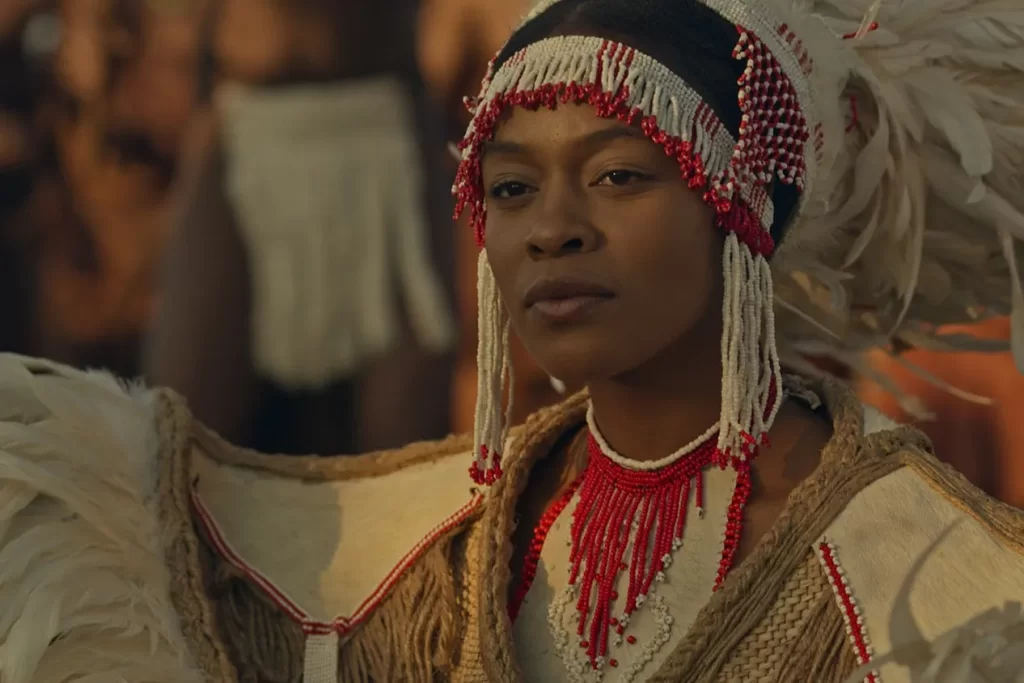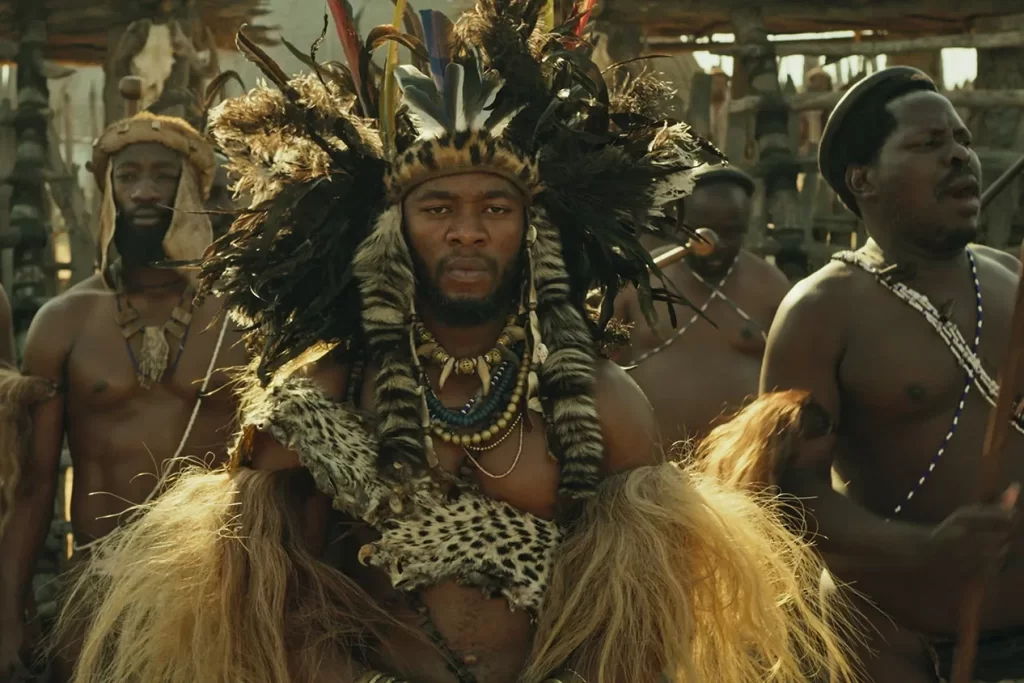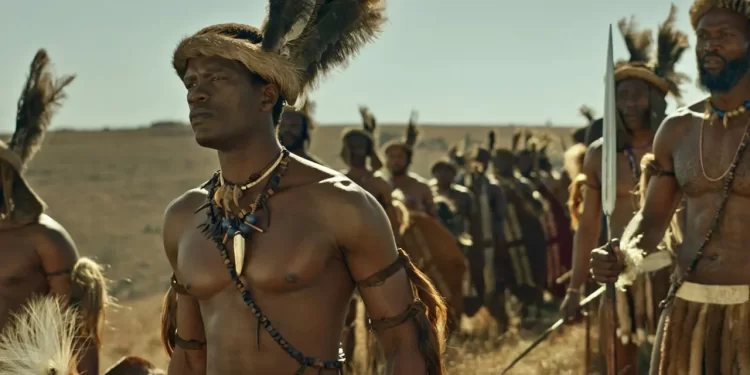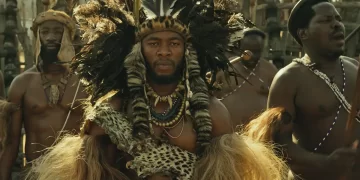The African continent, for all time preceding the twenty-first century, has often been described as the land of savages, the dark forest. Westerners, easterners, northerners, and all other er’s of every cardinal point had a very dim and limited view of this place, supplied by explorers and Joseph Conrad’s Heart of Darkness. Our story has always been told for us, and now it is finally being told by us. South African epic drama Shaka iLembe chronicles one of the most mythic legends in African history: the great King Shaka Zulu.
Set in the 1700s, Shaka iLembe tells the story of the making of the iconic African King with iterations from his early childhood through to adulthood. Though the show is a 12-part series, I am reviewing only the first ten episodes that had been released at the time of this writing.
From the very first minutes of the very first episode, I was terribly impressed by this show. This is the most meticulously produced entertainment this ‘dark continent’ has come up with yet, and it should be a shining beacon to every filmmaker on this land. Shaka iLembe took six years to make, and all those hours of hard work and research, consistency and dedication are all visible in the finished product: the pulsing percussion-heavy soundtrack, the beautifully rendered cinematography, the devilishly detailed costumes and sets, the studied character acting, and everything else in between. More on all of this later.
Broadcast and streaming ‘content’ (a word I abhor) from Africa in the past decade has grown much, and now we can watch high production value from our people on platforms like Netflix, Showmax, Prime Video etc. I have celebrated this fact as much as the next person, however, I have been tortured with the notion that perhaps, production value wasn’t what we needed most.
Most criticism hurled at our shows and movies—not even from critics like myself, but from the public—has been overwhelmingly singular in that most people think they are fed western stories in a local setting. Why not just watch the originals? Our filmmakers have truly and utterly lacked a coherent point-of-view for the longest time. They clearly lack historical knowledge on the how, why, and to whom genres and tropes exist, not to mention the ripe low-hanging fruits of possible African entertainment that remain unexplored. Film schools today don’t even bother with this kind of academic exploration. They have taught our young filmmakers how to make a shot and movie look like Spielberg, but not how to be independent thinkers.
Shaka iLembe is one of the aforementioned low-hanging fruits of possible African entertainment, now made real by a dedicated South African team at Bomb Productions, led by Oscar nominee Angus Gibson. The show traces, in epic proportions, the story of an African King who really needs no introduction—Shaka Zulu – but still sees it worthy to give the man five episodes of introduction before we can even barely glance at a pre-pubescent Shaka. It seems important to the filmmakers that we understand the story before Shaka to appreciate the story of Shaka. I have once seen this story dramatised peripherally—my older brother was watching a production some years ago, and I can’t remember if it was the 2001 TV movie or the 1986 series —but I know for certain that nobody will mistake or ever have blurry memories of watching this MultiChoice’s ambitious project.

Allow me to talk about Shaka iLembe’s cinematography before anything else. I said previously that I was impressed by this show from the very first moments of it—from drone shots of green hills and mountains (this was filmed in the vast expanse of KwaZulu Natal and Gauteng) to voice over from our narrator Dawn Thandeka King, who also plays Princess Mkabayi, a major character in the story. We then see the first sets of the show—the village of eLangeni, with ornate huts that I’m not sure were there before or were built for the show. My uncertainty is certainly a good word for this program. Everything feels very lived in.
I must reiterate that this show’s biggest credit goes to the cinematography; these guys really know how to light dark skin. The manner of lighting and shooting white skin versus darker skin is completely different. It’s about three points harder doing the latter, and many industries, from beauty to film, have failed. This problem is not exclusive to Africa; it’s a Hollywood problem and very much a global one. One of the few people who truly understand this issue is American cinematographer James Laxton, best known for his work with director Barry Jenkins. Shaka iLembe has a similar look to films like If Beale Street Could Talk; it’s similarly polished and pretty, elevating black beauty that even the atrocious villains in their Ndwandwe village look like gods.
Shaka iLembe breaks new ground into the almost non-existent realm of prestige African television. It’s expensive (backed by a multi-million-rand production budget), classy, and artistic. Some people have described it as Africa’s Game of Thrones, but how does it compare to that cultural monument? Both shows are ensembles, giving the audience exciting meetings between characters who never knew the other existed. Both shows are also essentially about the accumulation, retention and collapse of power – the eternal themes for the human race. Shaka iLembe can be labelled ‘our’ Game of Thrones not because it’s similar in structure but because it’s true to its point-of-view. If there’s anything African filmmakers can glean from this show, here’s a nice analogy: it’s not to go out there and raise eight million dollars for a production, it’s to understand from what lens (an original authentically African one, preferably) to look with that universal American camera.
Much like a lot of medieval television shows or those set many centuries ago, not just GoT, Shaka iLembe is primarily about honour and fulfilling your destiny. It fits so perfectly because that’s inherently what African culture was about, and especially in that era. After defeating a feared bandit and returning the king’s cattle, Shaka is given the same rescued cattle but asks the king’s permission to share it with his friends who went on the hunt with him. That’s how he earns not only their love but their loyalty. That’s how he became a general. His story of honour and bravery comes after many episodes of his elders doing the same.
The costumes are accurately uncompromising and true to the history of that time, which is to say, as bare as possible. Royalty wear beads around their ears and face and have head garments like towers of gilded hair. There may not have been golden crowns and storeyed palaces, but these royals emanate blue-bloodedness when viewed relative to the rest of the cast. Most of the women are bare-chested; booooobs. Almost everybody today is a pervert, so this would’ve made great bait before the internet and social media made nudity a veritable dress code, but today, after about twenty minutes of episode one, it ceases to occupy the mind. Either the zeitgeist or the strength of Shaka iLembe’s narrative is to ‘thank’ for that. Some of the men are in good shape (notably the Zulu Prince Senzangakhona turned King, father of Shaka), with vigorously shaped six-packs, and some are pot-bellied; a varied population that gives these villages more feeling of verisimilitude.

The performances are altogether strong and bounce off each other to heighten the story and sell it as the stuff of legend. The main characters in this ensemble for the first few episodes are Nandi, the mother of Shaka, played with magnificence by Nomzamo Mbatha, and Senzo Radebe, who showcases both his flawless body and stellar acting chops as Senzangakhona, the prince who subsequently becomes the king, and father to Shaka. Radebe’s performance is virtuoso due to the level of change demanded from the character and actor. In the beginning, he is charming and confident, winning our hearts along with Nandi’s, before he transforms into a cruel king, jealous of his own son’s destiny. Ntando Zondi gives a strong and sustained performance as the young Shaka Zulu, and when we look at his always-questioning face, we see the promise of something. And when he finally does make an appearance in episode eight, Lemogang Tsipa’s performance as the grown Shaka starts weak and deceivingly disappointing, for all mortal men were once boys before being lauded as gods, and we see his character development and brilliance in about two or three episodes; very condensed, but probably the most convincing in the entire show.
Set at a very crucial time in African history, Shaka iLembe also makes aversions and excursions into the then declining eighteenth century slave-trade in the South, the Portuguese being the culprits in that cape. By episode seven, they still had only touched on this aspect of the story, with a couple of scenes sprinkled here and there. During the introduction to a young liberal-minded prince from Mthethwa, a neighbouring village to the Zulu—a fantastic scene—the prince, Dingiswayo, played with ebony aristocratic panache by Thembinkosi Mthembu, is seen trading ivory for simple European products like a chair. In primary school, our history teachers made fun of the ignorance of our forebears’ chiefs and the way their stupidity sold the souls and bodies of their own people. From this young hero’s perspective, he sells trunks of ivory, which are of little to no use to him to get corn, a food crop new to him, and a chair for his father, the King. He traded, not maliciously or thoughtlessly or stupidly, but with the best intent and knowledge he could possibly have. To him, it was a good deal—and so it was. He was a prince, he was a trader, he was unthreatened by far more advanced visitors (he was brave), and when the scene closes, with a wonderful score underneath it, as the foreigners hurriedly take their loot away, he serenely bites down on the corn and looks at his lands, and the bright horizon of his world. I believe he is contemplating the open future and the limitless possibilities, which he doesn’t know will soon be taken away from him.
Shaka iLembe transcends entertainment while having it as a top priority. There is much to be gleaned from the show, in between the lines. A lot of nuances that have been lost to history, or failed to be passed down, are enacted in a way that truly reflects the line of culture and elegance we descend from. Like the young Shaka, I recently took to braiding my hair to the chagrin of several uneducated opinions. I’d urge everybody who respects their last name to watch this show and to watch it carefully. This is high-value entertainment that is also a history lesson.
Update: Shaka iLembe is now streaming on Showmax.
Enjoyed this article?
To receive the latest updates from Sinema Focus directly to your inbox, subscribe now.











